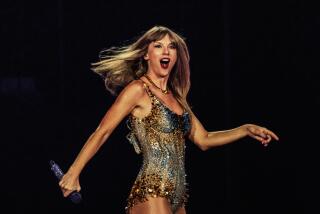Talent, fine-tuned
- Share via
There was a time when it was clear what to expect at a Diana Krall concert -- a collection of standards and jazz classics, sung and played with rousing spirit, elegant swing and improvisational invention.
All those qualities were amply present in her performance at the Greek Theatre on Friday night. If anything, Krall, as she approaches her 40th birthday later this year, has continued to fine-tune her world-class jazz singing and piano playing.
But there were other elements in the concert as well. Her latest album, “The Girl in the Other Room,” showcases a newly emerged aspect of Krall’s skills: her work as a songwriter, mostly in partnership with her husband, rock performer Elvis Costello. And, understandably, she included several of the originals from the CD.
Which made for an evening with a sometimes distractingly split musical personality. Krall started with an instrumental -- untitled, she said -- giving her and the fine accompaniment team of Anthony Wilson, guitar, Robert Hurst, bass, and Peter Erskine, drums, an opportunity to warm up and stretch out.
She followed with “All or Nothing at All,” its declamatory phrasing allowing her to punch out the melody with the propulsive drive of a jazz horn. And when she spun into her piano solo, her lines were filled with delicately roving curlicues, interspersed with sudden chordal bursts, an impressive example of her growing maturity as an imaginative improviser.
Krall was equally compelling in the other standards on the program: an atmospheric “Let’s Face the Music and Dance,” a gently rocking “East of the Sun” and a Nat King Cole-inspired “I’ll String Along With You.” And a pair of numbers by two of the jazz world’s best songwriters -- Mose Allison’s “Stop This World” and Bob Dorough’s “Devil May Care” -- afforded Krall the opportunity to reveal the wit and whimsy in a lyric.
The material from “The Girl in the Other Room” CD was a different matter entirely. Songs such as the title tune and “Abandoned Masquerade,” co-written with Costello, were dramatic departures from the Great American Songbook numbers that have been the foundation of Krall’s career. Filled with busy, inward-looking lyrics, the new songs occasionally offered unexpected twists of melody -- a tribute to Krall’s budding composition skills but less effective as a full-fledged vehicle for her superior interpretive abilities.
Costello’s “Almost Blue,” Tom Waits’ “Temptation” and Joni Mitchell’s “Black Crow” were better, in part because they were dense enough to provide sufficient creative stimulation. Like a rendering of Mitchell’s “A Case of You” that Krall has performed in previous appearances, they were revealing indications of her capacity to expand repertoire into more current material, so long as the material provides enough musical challenge.
Krall’s “The Girl in the Other Room” CD has cracked the million-copy sales ceiling, so it’s hard to argue with success. But the musical value of this pop-oriented stage in Krall’s performing career is more visible, ironically, in the growing sophistication of her jazz piano and singing, rather than her capacity to prove herself as a genre-crossover performer.
More to Read
The biggest entertainment stories
Get our big stories about Hollywood, film, television, music, arts, culture and more right in your inbox as soon as they publish.
You may occasionally receive promotional content from the Los Angeles Times.










